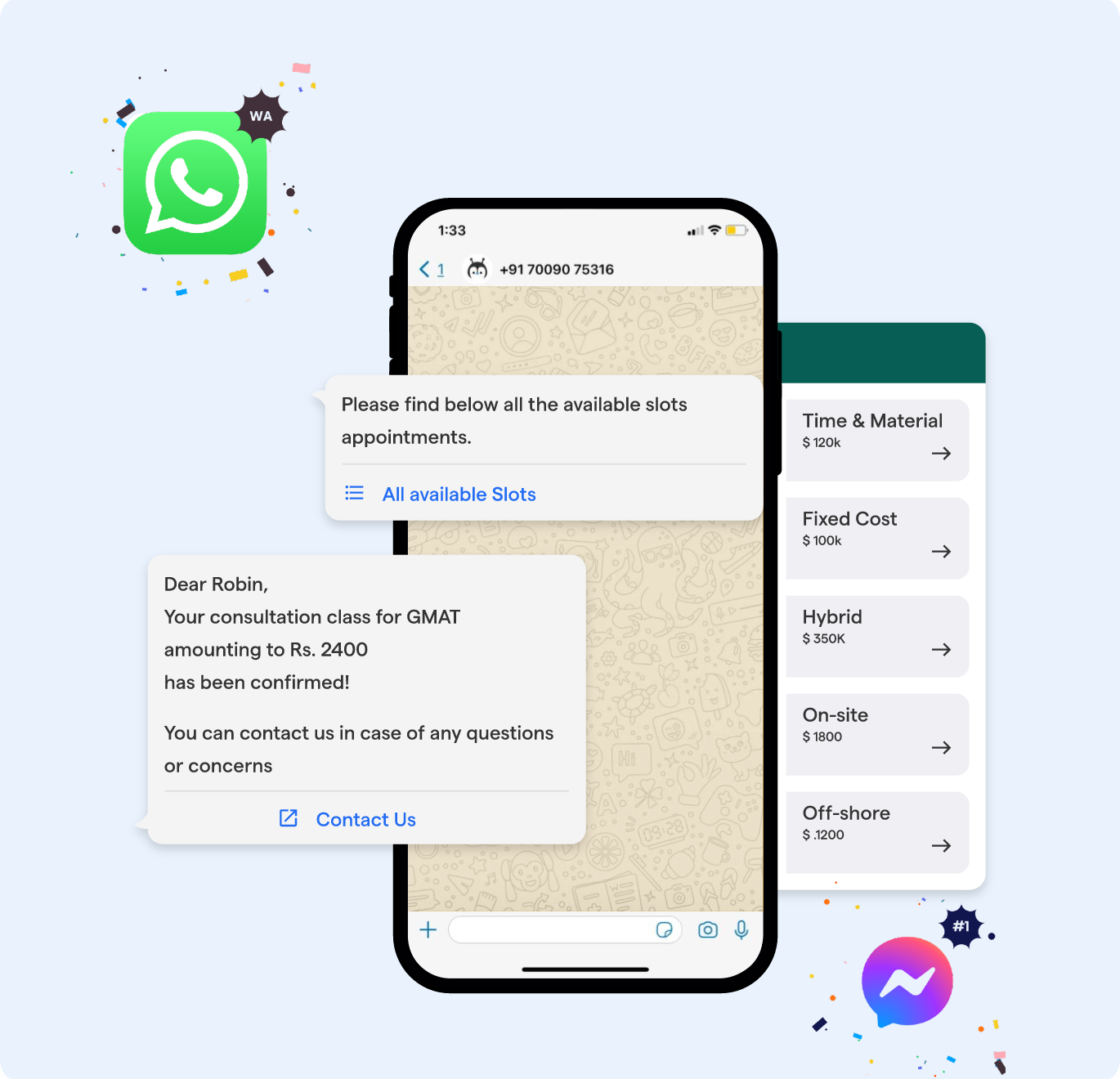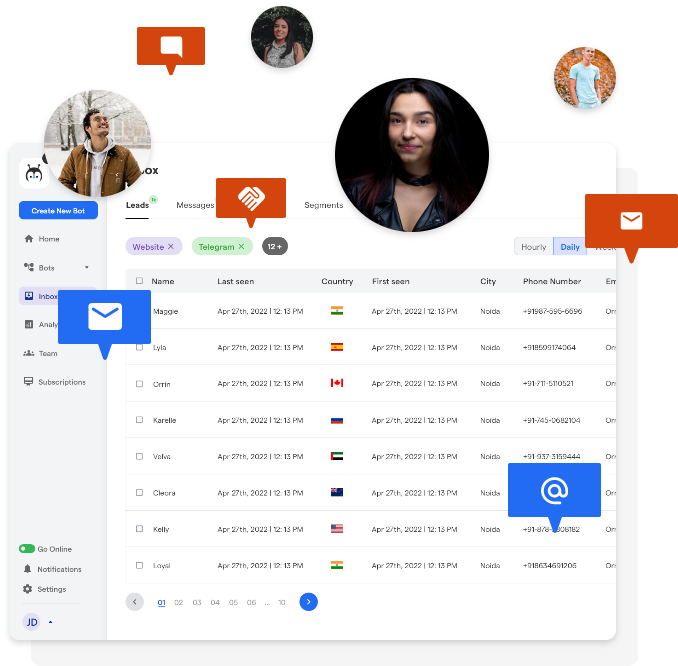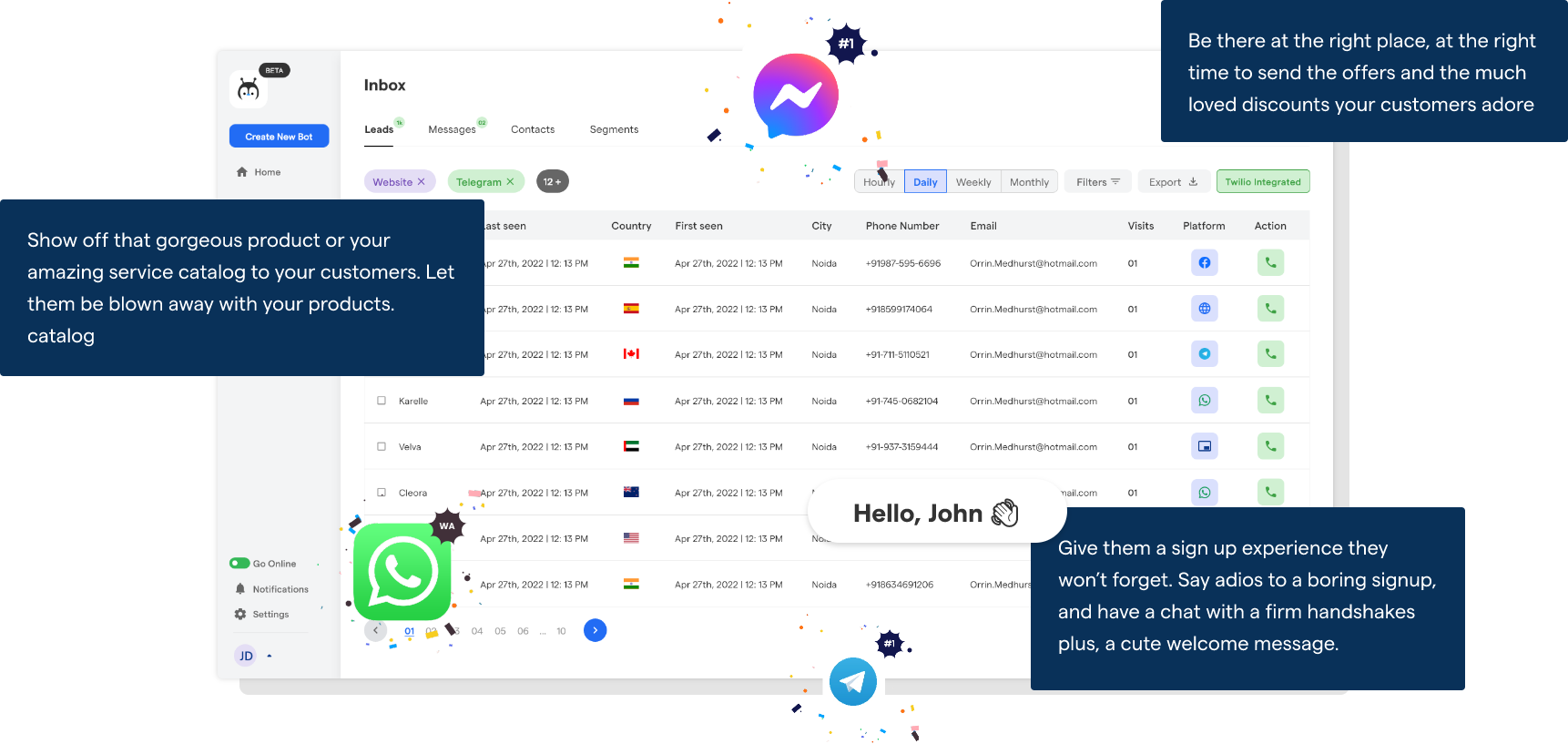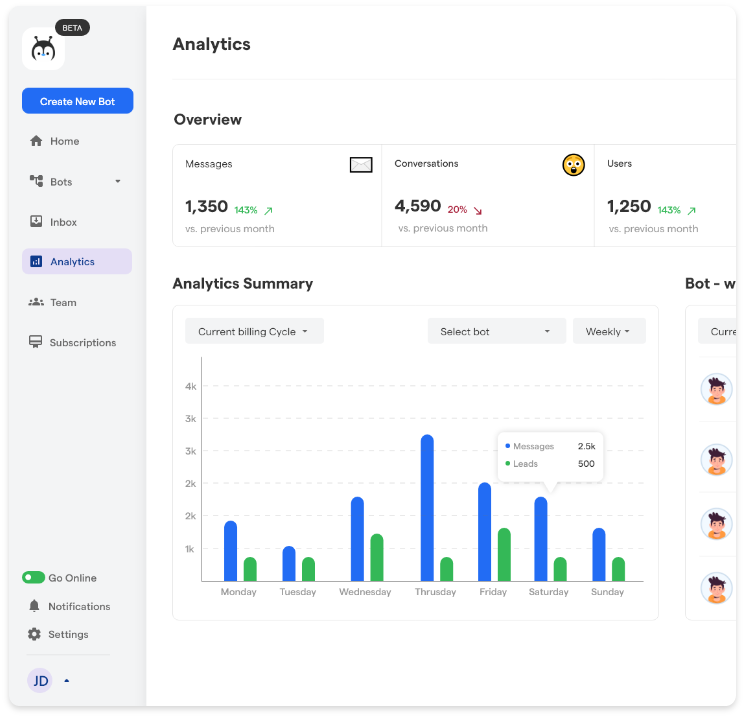Chatbots have become indispensable tools for lead generation. As lead gen chatbot has the ability to qualify prospects in real-time while delivering personalized, 24/7 support provides immense advantages.
Recent surveys by Statista show that 67% of consumers now regularly use chatbots, with leading companies reporting up to 70% of all customer inquiries handled completely by bots.
Lead generation chatbots excel at capturing leads through website pop-ups, SMS follow-ups, and messaging app integration. Advanced natural language processing allows for understanding customer needs to recommend relevant offers. Lead gen chatbots can also nurture leads by sending helpful content and tips until prospects are sales-ready.
Looking ahead, Juniper Research forecasts that chatbots will deliver over $142 billion in cost savings by 2023, making them a highly cost-effective channel.
Hence, it's time for evaluating strategies based on costs versus tangible results that will optimize lead gen ROI.
However, before all the nitty gritties let's understand lead generation Chatbots in detail.
Understanding Lead Generation with Chatbots
Lead generation is a crucial aspect of any business's marketing strategy. It involves identifying potential customers and capturing their interest to convert them into leads.
Traditional lead generation methods like forms and landing pages are effective, but chatbots have revolutionized the process.
Chatbots are automated tools that can engage with users, answer their queries, and collect valuable information. Let's dive deeper into the lead generation process with chatbots, the types of leads they generate, and the benefits they offer.

Types of Leads Generated through Chatbots
Chatbots can generate different types of leads depending on the business objectives. Some common types include:
- Information Leads: These are leads who provide their contact details in exchange for specific information or access to valuable content.
- Appointment Leads: These leads are interested in scheduling appointments or consultations and provide their information for follow-up.
- Sales Leads: These leads express interest in a product or service and are willing to receive sales-related information.
- Support Leads: Chatbots can also generate leads by offering customer support and capturing inquiries or issues for further follow-up.
Benefits of Using Chatbots for Lead Generation
Using chatbots for lead generation brings several advantages to businesses. Here are some key benefits:
- Enhanced User Experience: Chatbots provide instant responses, personalized recommendations, and a conversational interface, improving the user experience and increasing engagement.
- 24/7 Availability: Unlike manual lead generation methods, chatbots can operate 24/7, allowing businesses to capture leads at any time, even outside of business hours.
- Qualification Efficiency: Chatbots can ask targeted questions to qualify leads based on their needs, interests, and purchase intent, saving time and effort.
- Data Collection and Segmentation: Chatbots can collect valuable data from leads, such as contact details, preferences, and behavioral data, which can be used for targeted marketing campaigns.
Now that we have a better understanding of lead generation with chatbots and the benefits they offer, let's explore cost-effective chatbot lead generation strategies that can deliver impressive results.
Cost-Effective Chatbot Lead Generation Strategies
There are several cost-effective strategies that businesses can employ to generate leads through chatbots. These strategies are not only budget-friendly but also yield satisfactory results. Let's explore two such strategies: pop-up forms and lead magnets, as well as automated email campaigns.

Pop-Up Forms and Lead Magnets
Pop-up forms and lead magnets are common but effective tools for chatbot lead generation. A pop-up form appears on a website or landing page, asking visitors to provide their contact details in exchange for valuable content or offers.
Lead magnets, on the other hand, are valuable resources such as e-books, whitepapers, or exclusive access to webinars. By offering lead magnets through pop-up forms, businesses can capture leads effectively.
Benefits of using pop-up forms and lead magnets
Some of the benefits of using pop-up forms and lead magnets include:
- Increased Conversion Rates: Pop-up forms grab the attention of website visitors, increasing the chances of lead capture and conversion.
- Data Collection: Pop-up forms allow businesses to collect key information from leads such as email addresses and names, enabling future communication.
- Lead Segmentation: By providing different lead magnets tailored to specific interests or needs, businesses can segment their leads for personalized follow-ups.
Implementation tips and best practices
Some implementation tips and practices include:
- Timing is crucial: Display the pop-up form at the right moment, such as when visitors show exit intent or after spending a specific time on the page.
- Offer value: Ensure that the lead magnet is relevant, valuable, and addresses the pain points or interests of the target audience.
- Keep it simple: Design a clean and user-friendly pop-up form with minimal fields to reduce friction and increase completion rates.
Automated Email Campaigns
Another cost-effective strategy is to leverage automated email campaigns for lead generation. Once a lead is captured through a chatbot, businesses can use email automation tools to send targeted, personalized messages to nurture these leads and move them through the sales funnel.

Advantages of using automated email campaigns
Advantages of using automated email campaigns are given below:
- Nurturing leads: Automated email campaigns enable businesses to provide relevant and timely information to leads, keeping them engaged and interested.
- Cost-effective scalability: Once set up, automated email campaigns can be sent to a large number of leads without requiring additional manual efforts or resources.
- Behavioral tracking: With email automation tools, businesses can track and analyze recipient behavior, such as email opens, clicks, and conversions, to refine their lead generation strategy.
Tips for creating effective email campaigns
Given below are tips for creating effective email campaigns:
- Personalization: Tailor email content based on lead preferences, interests, and actions taken on the website or chatbot interactions.
- Clear call-to-action: Include a clear and compelling call-to-action that directs leads to the next step in the conversion process.
- Testing and optimization: Continuously test and optimize email subject lines, content, and send times to improve open and click-through rates.
By implementing these cost-effective chatbot lead-generation strategies, businesses can generate high-quality leads without breaking the bank.
Suggested Reading:
High-Investment Chatbot Lead Generation Strategies
In this section, we will explore high-investment chatbot lead-generation strategies that can maximize your results.
Advanced AI-Powered Chatbots
AI-powered chatbots are revolutionizing the way businesses engage with their customers. These chatbots leverage advanced AI algorithms to provide more sophisticated and personalized conversations. They can understand natural language, learn from previous interactions, and provide accurate responses.
Exploring the potential of AI chatbots in lead generation
Advanced AI chatbots have the potential to take lead generation to the next level. By analyzing conversations, they can identify intent and capture lead-specific information more effectively. AI chatbots can ask intelligent questions to qualify leads, understand their preferences, and offer tailored recommendations. They can even analyze customer data to predict future needs and proactively engage leads.
Evaluating the ROI of advanced AI-powered chatbots
Investing in advanced AI-powered chatbots can significantly impact your lead-generation efforts. These chatbots can automate lead qualification, lead nurturing, and even sales processes. They reduce manual intervention, enabling your team to focus on high-value tasks. By delivering a personalized and efficient chat experience, AI chatbots can increase conversion rates and improve overall ROI.
Personalized Chat Experiences
Personalization has become a key aspect of successful marketing strategies, and chatbots are no exception. Through personalized chat experiences, businesses can engage leads on a deeper level and create stronger connections.

Benefits of personalizing chat experiences
Personalized chat experiences offer several advantages in lead generation:
- Enhanced User Engagement: Personalization makes the conversation more relevant and interesting to the lead, increasing their engagement and conversion chances.
- Improved Lead Qualification: By tailoring questions and responses based on the lead's preferences and behavior, chatbots can better qualify leads and capture more valuable information.
- Increased Trust and Satisfaction: Personalization shows that you understand the lead's needs and interests, fostering trust and satisfaction.
Tips for creating personalized chat experiences
To create effective personalized chat experiences, consider the following tips:
- Start with Segmentation: Segment your leads based on their demographics, behavior, or preferences. This allows you to tailor the chat experience to their specific needs.
- Use Dynamic Content: Integrate chatbots with your CRM or customer database to personalize conversations with known leads. This can include addressing them by name or referencing previous interactions.
- Leverage Real-Time Data: Utilize real-time data on website browsing behavior or referral sources to personalize chatbot greetings or recommendations.
Combining Strategies for Optimal Results
To ensure maximum success in chatbot lead generation, it's important to combine both cost-effective and high-investment strategies.
While cost-effective strategies capture a large volume of leads, high-investment strategies provide more personalized and targeted approaches. Combining both can help you generate a larger quantity of valuable leads while ensuring they receive a tailored experience.
Creating a Multi-Channel Approach
Lead generation should not solely rely on a single channel. Incorporating multiple channels can expand your reach and capture leads at different touchpoints.
Benefits of using multiple channels for lead generation
Using multiple channels offers several benefits:
- Wider Reach: Different channels attract different audiences, allowing you to reach a broader range of potential leads.
- Diversified Engagement: By engaging leads through multiple channels, you can capture their attention and maintain their interest over time.
- Increased Conversion Opportunities: Each channel provides unique conversion opportunities, increasing the chances of converting leads.
Strategies for integrating chatbots across platforms
To integrate chatbots across multiple platforms, consider these strategies:
- Website Integration: Embed chatbots directly on your website to engage visitors and capture leads.
- Social Media Integration: Use chatbot tools that allow integration with popular social media platforms to engage your social media followers and convert them into leads.
A/B Testing and Continuous Optimization
Optimization is a crucial aspect of any lead generation strategy. A/B testing allows you to experiment with different approaches, identify what works best, and continuously improve your chatbot lead generation performance.
A/B testing involves comparing two or more variations of a chatbot or messaging sequence to determine which performs better. It helps you identify the most effective language, design, or call-to-action to optimize lead generation.
Best practices for conducting A/B tests
When conducting A/B tests for your chatbot lead generation, follow these best practices:
- Define Clear Objectives: Clearly define the goals and metrics you want to improve through your A/B test.
- Test One Variable at a Time: To accurately identify the impact of each variation, only change one variable at a time.
- Collect and Analyze Data: Gather sufficient data during the test period and analyze results to determine the winning variation.
By combining cost-effective and high-investment strategies, integrating chatbots across multiple channels, and continuously optimizing with A/B testing, you can generate high-quality leads and improve conversion rates. Incorporate these strategies into your chatbot lead-generation efforts to maximize your results and grow your business.
Measuring and Analyzing Lead Generation Results
Like any lead generation strategy, it's important to measure and analyze the results to ensure that you're getting the most out of your investment. In this section, we'll discuss key metrics to measure lead generation success, focusing on conversion rates and cost per lead (CPL).

Conversion Rates
Conversion rates play a crucial role in determining the success of your chatbot lead generation strategy. A conversion rate measures the percentage of website visitors who take a desired action, such as filling out a form or subscribing to a newsletter. It is important to track conversion rates to gauge the effectiveness of your chatbot in engaging and converting potential leads.
Importance of tracking conversion rates
Tracking conversion rates is essential because it provides insights into the performance of your chatbot. Low conversion rates may indicate issues with your chatbot's functionality or messaging. Conversely, high conversion rates suggest that your chatbot is effectively engaging visitors and motivating them to take the desired action.
Tools and techniques for tracking and improving conversion rates
To track conversion rates, you can utilize analytics tools specific to chatbots, such as Chatbot Analytics or similar platforms. These tools provide valuable insights into user behavior, interaction patterns, and conversion rates. By analyzing this data, you can identify areas for improvement and implement strategies to enhance your conversion rates. A/B testing is a useful technique for testing different chatbot messages, layouts, or offers to optimize conversion rates.
Cost per Lead (CPL)
Understanding the cost per lead (CPL) is crucial for evaluating the efficiency and profitability of your chatbot lead generation strategy. CPL is the amount of money you spend to acquire one lead. By tracking your CPL, you can assess the return on investment (ROI) and make data-driven decisions.
Understanding the concept of cost per lead
Calculating CPL is simple. Divide the total cost of your chatbot lead generation campaign by the number of leads generated. For instance, if you spend $1000 and generate 100 leads, your CPL would be $10.
Strategies for reducing CPL
Reducing CPL improves the cost-effectiveness of your chatbot lead generation strategy. One effective strategy is to optimize your targeting to reach a specific audience that is more likely to convert. By targeting customers who are genuinely interested in your products or services, you can increase the chances of generating qualified leads at a lower cost. Additionally, streamlining your chatbot's workflow, optimizing landing pages, and enhancing user experience can contribute to a reduction in CPL.
Measuring and analyzing lead generation results is fundamental to determining the success and efficiency of your chatbot lead generation strategy. By monitoring conversion rates and CPL, you can identify areas for improvement, optimize your chatbot's performance, and achieve better results.
Conclusion
In conclusion, chatbot lead-generation strategies can be highly effective in driving results for businesses. By properly measuring and analyzing key metrics such as conversion rates and cost per lead, companies can determine the success and efficiency of their chatbots.
Tracking conversion rates helps to evaluate how well chatbots are engaging visitors and motivating them to take desired actions. Understanding the cost per lead allows businesses to assess the return on investment and make informed decisions.
By continuously optimizing and refining chatbot strategies, businesses can achieve better results and maximize the value of their lead-generation efforts.
BotPenguin provides intuitive chatbot platforms that make optimization easy. Real-time analytics empower businesses to track conversion rates and cost per lead to gain insights that maximize ROI. With BotPenguin's innovative technology, any company can implement high-performing chatbots that engage and convert website visitors into quality leads.
It's times like these when you need to be omnipresent. And that is what BotPenguin helps you with. By creating ready-to-deploy chatbots for multiple platforms, BotPenguin makes sure that it is easy for you to handle multichannel communication:
Frequently Asked Questions (FAQs)
How much does a lead generation chatbot cost?
The cost of a lead generation chatbot by BotPenguin varies based on complexity, features, and customization. It can range from free to paid plans, depending on the chosen platform, integration requirements, and desired functionalities.
What is a lead generation chatbot example?
An example of a lead generation chatbot engages website visitors, collects their contact information, and provides relevant information or incentives to encourage them to express interest in products or services, ultimately converting them into potential customers.
Why is lead generation important to businesses?
Lead generation is crucial for businesses as it helps identify potential customers interested in their products or services, enabling targeted marketing efforts. Effective lead generation strategies contribute to a consistent pipeline of qualified leads, fostering business growth, and increasing the likelihood of conversions and sales.
How can businesses measure the effectiveness of chatbot-driven lead generation?
Businesses can measure effectiveness by tracking metrics such as lead engagement rates, conversion rates, customer satisfaction scores, and the overall impact on the sales pipeline, helping assess the ROI of chatbot lead generation strategies.


